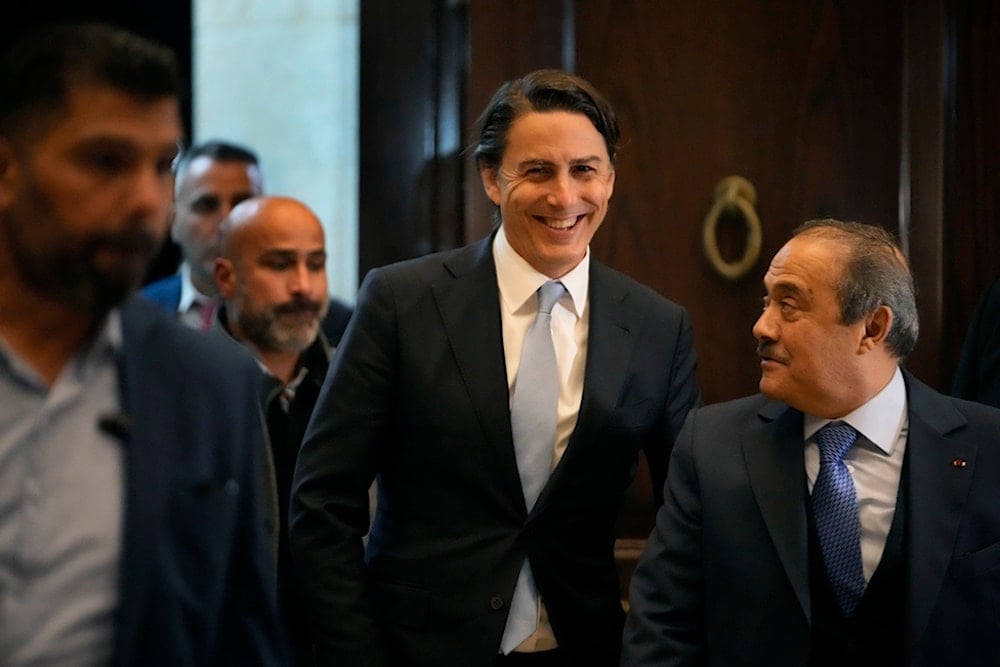US, Saudi pressured Lebanese MPs into electing president: Axios
Axios reveals that Saudi Arabia and the United States carried out a joint bid to have the Lebanese parliament elect a president, and their pick was Joseph Aoun.
-

Amos Hochstein, a senior advisor to President Joe Biden, smiles upon his arrival to meet with Lebanese Parliament Speaker Nabih Berri, in Beirut, Lebanon, Monday, January 6, 2025. (AP)
The Biden administration and President-elect Donald Trump's team worked in close coordination to ensure the election of Gen. Joseph Aoun as Lebanon's new president, Axios reported, citing US officials and sources familiar with the matter.
Aoun's election broke a political deadlock that left Lebanon without a president for over two years. The effort gained momentum six weeks ago, following the signing of a ceasefire agreement between the Israeli occupation and Lebanon. One day after the ceasefire took effect, the speaker of the Lebanese parliament, Nabih Berri, announced that presidential elections would take place on January 9.
In the weeks leading up to the election, the Biden administration and Saudi Arabia led a joint initiative to secure the outcome, with support from France and Qatar, according to US officials. This campaign culminated in a visit to the region by President Biden's envoy, Amos Hochstein, who played a central role in lobbying for Aoun's candidacy.
During his trip, Hochstein privately advocated for Aoun, whom the Biden administration views as a professional, pro-Western figure opposed to Hezbollah and by extension the Axis of Resistance, Axios reported.
Massive coordination effort
Coordination between the outgoing and incoming US administrations was instrumental in this effort. Before his trip, Hochstein and White House National Security Advisor Jake Sullivan met with Trump's National Security Adviser, Mike Waltz, to align their positions. Hochstein also briefed Trump's Middle East envoy, Steve Witkoff, on the developments surrounding the Lebanese presidential election, according to Axios.
Hochstein traveled to Riyadh on Sunday, meeting with Saudi Foreign Minister Prince Faisal bin Farhan and envoy Prince Yazid bin Farhan to coordinate their strategy, a US official said. He then traveled to Beirut, where he engaged in extensive discussions with key Lebanese political figures.
On Monday, Hochstein met with Speaker Berri and Acting Prime Minister Najib Mikati, with Aoun later joining the talks. Later that night, Hochstein held a crucial meeting with Lebanese Forces leader Samir Geagea at his mountain fortress. Axios reported that Hochstein worked until after midnight to persuade Geagea to drop his opposition to Aoun's candidacy and instruct his party's lawmakers to support Aoun.
Amping up the pressure
The following morning, Hochstein hosted a breakfast meeting with several dozen Lebanese lawmakers, many of whom were still undecided. During the meeting, one lawmaker challenged Hochstein, asking, "Who gives you the right to decide who will be the president of Lebanon?" according to a US official.
Before departing Beirut on Tuesday, Hochstein called Saudi envoy Prince Yazid and urged him to travel to Lebanon to continue pressing lawmakers. Yazid complied, heading to Lebanon and carrying on with the lobbying effort.
"The Saudis played a key role. It was essentially a joint effort by [Saudi Crown Prince] Mohammed bin Salman and the Biden administration," a US official told Axios.
Who is the 14th president of the Lebanese Republic?
Joseph Aoun has served as the Commander of the Lebanese Army since March 8, 2017, succeeding General Jean Kahwaji. His military career began in 1983, marking the start of his long service in the army.
He was promoted to Brigadier General in 2013 and continued to rise through the ranks, achieving the rank of General in 2017. That same year, he was appointed Commander of the Army, leading during one of the most sensitive periods in Lebanon's history.
Lebanon faced significant security and political challenges during this period, including the notable "Dawn of the Outskirts" battle in 2017. In this operation, the Lebanese Army, in cooperation with Resistance forces, fought against terrorist organizations on the outskirts of the towns of Arsal and al-Qaa, located on the Syrian border.
The country also faced significant security challenges following the outbreak of protests on October 17, 2019, and the prolonged Israeli war on Lebanon in 2023, which lasted over 60 days. These events placed new responsibilities on the Lebanese Army, particularly with the signing of the ceasefire agreement.
Read next: An overview of Lebanon's presidential election process

 4 Min Read
4 Min Read








